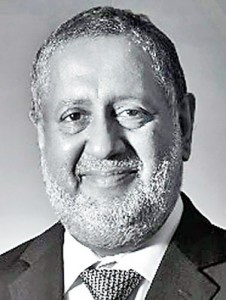Don’t be victims of your own mindset – Binod
Businessmen in this part of the world tend to become victims of their own mindset, according to a Forbes billionaire.
“We tend to be victims of our own mindset. Businessmen need to come out of the comfort zone,” said Binod K. Chaudhary Chairman, CG Corp Global, Nepal speaking at the 178th AGM of Ceylon Chamber of Commerce on Thursday in Colombo.

Rajendra Theagarajah
He said that businessmen should be at the effect (powerless) of their business or act as the cause (in power) of it. “Your internal belief system about business is the most important predictor of success or failure.
In order to train toward success, one needs to be resilient to stress, change and uncertainty, he said.
He reprimanded the laidback attitude of most South Asian businessmen saying that they need to come out of their comfort zone.
“We have this habit of passing the buck to politicians,” he further told the Business Times on the sidelines of the AGM adding that most South Asian businessmen don’t have ‘that’ fighting spirit.
Times have gone where capital was a constraint and family connections did ‘the thing’, he said. “The world is technologically connected. That’s the future.”
He said the capital-centric traditional industries such as textile, jute, sugar and steel used to rule the market. Those days have now ended.
“The paradigm of entrepreneurship has changed. Trendy Youtubers are compelling traditional television broadcasters to rethink their survival, teenage Instagram starts are becoming case studies for marketing gurus.
“We are going through disruptive changes,” he said listing examples of three new businesses – Uber — the biggest taxi service in the world, which does not own a single car, Airbnb — the biggest online hotelier with the maximum number of rooms, which does not even have a single hotel of its own and Alibaba – the biggest e-trading platform, which does not have a single factory or warehouse of its own.
The commonalities among them are – they rely on modern technology.,use the recent Internet-based tools, geographical and political boundaries do not deter them from doing business, they connect people who need the product with people who have the product and are willing to sell. “They provide a forum where the service provider and recipient come together,” Mr. Chaudhary highlighted.
“We businessmen seek opportunity in crisis. We are entrepreneurs. We don’t care about resources, we create our own resources.
We lead, we don’t passively follow! We convert crisis into opportunity,” he said adding that you cannot have the best environment all the time and that with a strong will and an agile mind, you can be successful entrepreneurs.
He said that he started business in Assam, in Northeast India where big corporate houses feared to go.
“I set up factories and started whole new business operations there when people were scared just by the thought of going to that part of India.
Even today, we’re setting up new hotels and Wai Wai plants in African countries such as Nigeria. Nobody would like to take the risk there. But that is not me. Without risk, life is boring.”
Sri Lanka is the beginning of the story not the end, Mr. Chaudhary added, highlighting that this country has the best of brains and its time they’re showcased. In this light, he said that he’s in discussion to take Siddhalepa to Nepal.
He said that as businessmen, making money is important, but more important than that is how we work with society in giving it back. “We cannot function in a vacuum. We have a big responsibility towards our society. We all need to fulfill that responsibility. Otherwise, our earning money will be useless.
For many of us, making money may be easy. But it is difficult using that money wisely toward helping our societies. Let us ask ourselves do we want to be remembered as ‘rich and mean businessmen’ or ‘rich and compassionate human beings’?” he queried.”
At the AGM, Rajendra Theagarajah was appointed as the new Chairman, succeeding outgoing Chairman Samantha Ranatunga, who led the chamber during the past two years. He functioned as the Vice Chairman, Deputy Vice Chairman and Board Member and also served as a member of the Chamber Committee for several years.
Dr. Hans Wijayasuriya was appointed as the Vice Chairman of the Chamber, while Vish Govindasamy was appointed as the Deputy Vice Chairperson for the year 2017 and 2018 financial year.
Mr. Ranathunga in his address said that the CCC had many engagements with the policy market during the last two years where the CCC articulated the chamber position. “We won some but we lost more.
However, in true chamber spirit we always put the country first more than narrow industry specific initiatives.
This is clear from the positions we have taken on taxation and trade agreements. We have taken on true country priorities and tried to bring them to the national or international platform”.
He said that what businesses seek in the Government is a true partnership. “The private sector always strives to build a bridge of trust with the Government leaving room for dialogue and healthy debate.
Let us use this as a connection for a brighter future, where we continue to build mutual confidence.”


